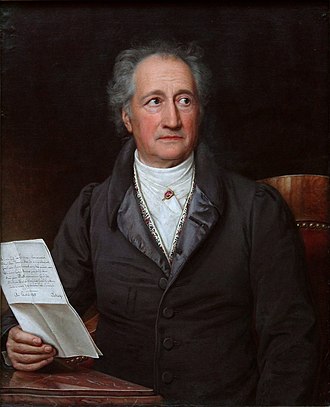Phenomenon

Oil painting by Joseph Karl Stieler, 1828

The phenomenon (Greek: φαινόμενον phainomenon "visible, appearance") is, in the broadest sense, a sensually or supersensually perceptible, simpler or more complex appearance, as it presents itself to immediate perception. Johann Wolfgang von Goethe called fundamental phenomena, which can be understood directly from their emergence, primordial phenomena.
Phenomenology is the study of phenomena.
Goethe's scientific work, through which he laid the foundations for later Goetheanism, is based on pure phenomenology, whereby he gradually traces more complex phenomena, whose origins cannot yet be understood, back to primordial phenomena.
In doing so, Goethe distinguishes the empirical phenomenon initially available to observation from the scientific phenomenon obtained through a multitude of systematic experiments, which, freed from all random fluctuating phenomena, is elevated to the status of a pure phenomenon. In "Experience and Science" (Erfahrung und Wissenschaft, 1798) he writes:
„What we would therefore have to show from our work would be:
- The empirical phenomenon which every human being becomes aware of in nature and which is afterwards
- is raised to the level of a scientific phenomenon through experiments, by presenting it under different circumstances and conditions than it was first known, and in a more or less fortunate sequence.
- The pure phenomenon now stands in the end as the result of all experiences and experiments. It can never be isolated, but it shows itself in a constant succession of phenomena. In order to represent it, the human mind determines the empirically wavering, excludes the accidental, separates out the impure, develops the confused, even discovers the unknown.
Here, if man knew how to be modest, would perhaps be the ultimate goal of our powers. For here we do not ask for causes, but for conditions under which phenomena appear; we look at and accept their consistent sequence, their eternal recurrence under a thousand different circumstances, their uniformity and changeability, recognise their definiteness and determine it again through the human mind.“
References
- ↑ Translated from: Goethes Naturwissenschaftliche Schriften, WA, II. Abteilung, Band 11, Weimar 1893, p. 38ff.
